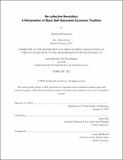| dc.description.abstract | The envisioning and deliverance of a collectively liberated future for all marginalized peoples is rooted in a rectified understanding of the redacted history of marginalized peoples. This paper uncovers a history of collective, collaborative, and communal economic traditions of pre-colonial societies in West Africa, with an anti-revisionist lens, in active repudiation of a capitalist, imperialist, and westernized erasure of Black self-subsistent, or self-reliant, economic tradition.
Through the excavation and utilization of anthropologic, archaeologic, and historic research as well as case studies, this paper highlights the Yorubaland (pre-colonial Nigeria) Guild System of trade and labor organization, the Ghanaian Nnoboa cooperative farming system, and the Rotating Credit and Savings Associations (roscas) of pre-colonial Nigeria. The paper proceeds with an examination of the Boston Ujima Project, the Boston Food Solidarity Economy, and the Center for Cooperative Development and Solidarity – Boston-based organizations and movements today that are actively intentioned on utilizing tools and approaches akin, and/or in intentional alignment with pre-colonial Black and indigenous collective principles and practice. Inspired and instructed by afrofuturism, emergent strategy and pleasure activism, this paper crescendos by engaging with these Black feministprovided frameworks through a communally-minded collectively self-reflexive dialogue addressing the plausibility of, reticence towards, and uncertainty accompanying this particular path towards collective liberation. | |
